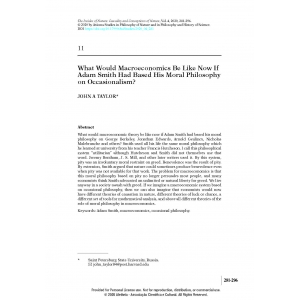What Would Macroeconomics Be Like Now If Adam Smith Had Based His Moral Philosophy on Occasionalism?
John A Taylor, “What Would Macroeconomics Be Like Now If Adam Smith Had Based His Moral Philosophy on Occasionalism?,” in The Insides of Nature: Causality and Conceptions of Nature, ed. Álvaro Balsas and Bruno Nobre, Axioma Studies in Philosophy of Nature and in Philosophy and History of Science 4 (Braga: Axioma - Publicações da Faculdade de Filosofia, 2020), 281–96, https://doi.org/10.17990/Axistudies/2020_04_281.









